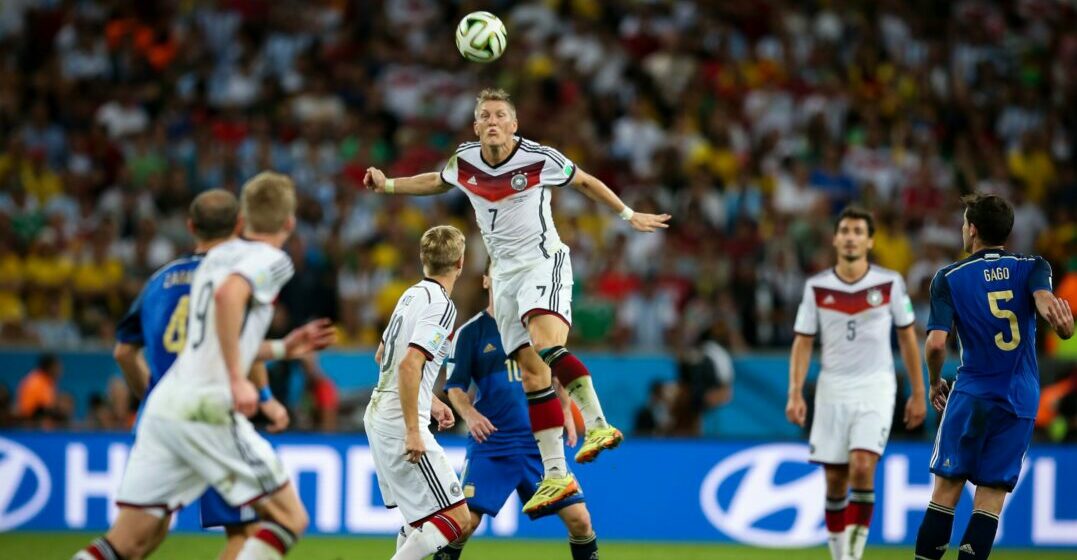Updated on April 29, 2024

The 6 greatest German football players of all time

One of the most important things you need to know about German culture is that they are fanatical about football. If you have ever been in a German Kneipe (pub) on a match day or have gotten caught up in the post-match rush on the S-Bahn, you’ll know that love of the beautiful game is ubiquitous in Germany.
The Deutscher Fußballbund (DFB), or German Football Association, is the world’s largest sports federation, with approximately 6.6 million members. That’s about 8% of the German population! With such avid national enthusiasm, Germany has naturally produced some phenomenal players. So here is a list of just some of the top German football players ever to have graced the field.
Loyal to the city of his birth, Fritz Walter (1920 – 2002) played for FC Kaiserslautern for his entire impressive career, bringing the team to the German championships in 1951 and 1953. However, he truly secured his place in the pages of football history when he led the West German football team to victory in the 1954 World Cup final against Hungary in Bern, Switzerland. Coming just 9 years after the end of World War 11, this victory was a significant moment that has come to symbolize Germany’s national recovery and healing. This astounding victory was remembered as the Das Wunder von Bern (The Miracle of Bern), a triumph immortalized in Sönke Wortmann’s renowned 2003 film of the same name.
Franz Beckenbauer (1945-2024), nicknamed Der Kaiser (The Emperor), is recognised in Germany and internationally as one of the greatest players in the history of football. Having played most of his professional career for his home team of Bayern Munich, the most successful German football club of all, Beckenbauer not only captained the victorious 1974 West German World Cup football team but also managed the West German football team that won the 1990 World Cup, only months before German unity, becoming the only man to have both captained and managed a World Cup winning team.
In his twelve years representing Germany internationally, Miroslav Klose became the nation’s top goal-scorer of all time and continues to hold the record for most World Cup goals scored. After prolific international and Bundesliga (Germany’s primary football competition) careers Klose retired after Germany’s 2014 World Cup victory, having earned himself gold, silver and bronze World Cup medals.
Bastian Schweinsteiger was born in 1984 and spent much of his footballing career at Bayern Munich. He is considered to be one of the best midfielders of all time, gifted in his understanding of game strategy. He had the honor of playing in four European Championships and three World Cups, and is the fourth most-capped German footballer. He played exactly 500 matches for Bayern Munich over 17 years, earning him the title of Fußballgott (God of football) amongst fans.
Born in 1967 in the former East Germany, Matthias Sammer began his professional football career playing for Dynamo Dresden in the DDR-Oberliga (the primary East German football league). After unification, he was part of the VfB Stuttgart team that became the first champions of the reunified German Bundesliga, and began a highly successful career representing the unified nation. He first earned the title of German Footballer of the Year in 1995, then in 1996 he was also named the best player of the EUFA Euro ‘96 tournament. When Sammer retired in 1998, he did so with a grand total of 74 caps, 23 for the former East Germany and 51 for the reunified Federal Republic.
Gerd “The Bomber” Müller (1945 – 2021) is renowned as one of the greatest goalscorers in football history, known specifically for making precision finishes within the penalty box. He held the record for the most World Cup goals ever scored for more than three decades, until Brazil’s Ronaldo overtook him in 2006. At international level, Müller scored 68 goals in 62 games playing for West Germany. In his Bundesliga career with FC Bayern München, he scored 365 goals, making him the highest goal scorer in the history of the league.
Whether you want to get out and join a local team, share in the banter with your German friends or enjoy a Bundesliga match over some beer and bratwurst, Germany’s joyful football culture is a spectacle you can quickly come to love. Now that you’re in the know about some of the legends of German football, you’ll be well-equipped to take your own dive into it. So choose your team, deck out in their colors and keep an eye out for the next German football player to enter the national history books as one of the best German football players of all time.